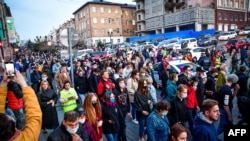Human rights activists and experts are calling on Moscow to provide safe passage for Choe Kum Chol, an elite North Korean cyberwarrior stationed in Vladivostok whose attempt to defect was foiled by Russian police.
“We need to call attention to the abuse of North Korean escapees, call on Russia to allow Mr. Choe to seek asylum,” said Robert King, who served as the U.S. special envoy for North Korea’s human rights under the Obama administration.
Choe, 33, a major in Pyongyang’s elite military cyberwarfare unit, escaped his North Korean minders in Vladivostok in July 2021 and fled to what was believed to be a safe location in the nearby town of Razdolnoe.
While in hiding, Choe was preparing to seek asylum from the office of the U.N. High Commissioner for Refugees (UNHCR) in Moscow but Russian police arrested him in September 2021 and handed him over to the North Korean consulate in Vladivostok. Russian police have a history of arresting North Korean defectors at the request of Pyongyang.
Born and raised in Pyongyang, Choe first came to Vladivostok in May 2019 to work in North Korea’s overseas cyberwarfare unit after years of education and training, and a similar cyberwarfare posting in China.
Fate remains unknown
Choe remains in the custody of North Korean officials in Vladivostok as of February 12, according to Svetlana Gannushkina, who heads the Civic Assistance Committee (CAC) based in Moscow, an organization that assists refugees and migrants in Russia.
After learning about Choe’s attempt to defect, from VOA’s Korea Service earlier this month, the CAC sought Choe to confirm that he was still held by North Korean authorities.
Gannushkina told VOA’s Korean Service on February 12 that a CAC-affiliated attorney learned “Choe is under detention in [the] DPRK consulate” in Vladivostok.” She also said North Korean authorities “could not move him across the borders” of Russia, which shares land and maritime borders with North Korea.
DPRK stands for North Korea’s official name, the Democratic People’s Republic of Korea.
Suzanne Scholte, president of the Defense Forum Foundation and a longtime North Korean human rights activist, said, “As long as he is in Russia, there is hope,” even if Choe is being held by North Korean authorities.
She continued, “In order to be forcefully repatriated to North Korea, Russia must allow him to leave the country with DPRK agents, so whether he lives or dies depends on the action of the Russian authorities.”
Greg Scarlatoiu, executive director at the Committee for Human Rights in North Korea, said it is “very unlikely” that Russia will grant a safe passage of Choe to a third country where he could seek asylum as “tensions between Russia and Western democracies are practically at an all-time high.”
The U.S., along the G-7 countries of Canada, France, Germany, Italy, Japan, and the U.K., condemned Russia for launching an invasion of Ukraine on Thursday after weeks of military buildup.
King said, “The only way that Mr. Choe can have an opportunity to request asylum is if Russian government officials give him permission.”
King continued, “It would require senior Russian government officials to make such a decision, and I think it is highly unlikely that that would happen.”
VOA’s Korean Service contacted the Russian Foreign Ministry as well as North Korea’s U.N. mission for comment on Choe’s case but did not get a reply from either of them.
Calls for protection
Shortly after VOA’s initial report on Choe, Lina Yoon, a senior researcher for the Asia division of Human Rights Watch, released a statement appealing to the Russian government to permit Choe’s asylum.
“The Russian government should publicly uphold the right of North Koreans to seek asylum in accordance with the 1951 Refugee Convention, which Russia has ratified,” said the statement. “It needs to protect asylum-seekers from enforced disappearance and prevent their forced return. Choe Kum [Chol] and other North Koreans in Russia should be provided safe passage to a third country,” continued Yoon.
The 1951 Refugee Convention is a U.N. treaty, which builds on the 1948 Universal Declaration of Human Rights and recognizes the rights of people to seek asylum from oppression in other countries and sets out the rights of refugees.
Yoon told VOA’s Korean Service last week that Human Rights Watch has been in contact with different rights organizations and several governments, urging them to come to Choe’s aid.
“We are seriously concerned about the fate of Choe Kum Chol, and we really hope that the Russian government [will] take responsibility and protects the refugees who will suffer horrific fates if they were sent back to North Korea,” said Yoon.
North Korean defectors caught and sent back to the country are known to face severe torture, imprisonment and even executions.
VOA’s Korean Service contacted the UNHCR in Moscow this week but did not get a reply. When VOA's Korean Service contacted the UNHCR in Moscow earlier in February, a representative for the office said, "Please note that UNHCR does not provide comments on individual cases."
Journalist William Kim contributed to this report which originated in VOA’s Korean Service.










